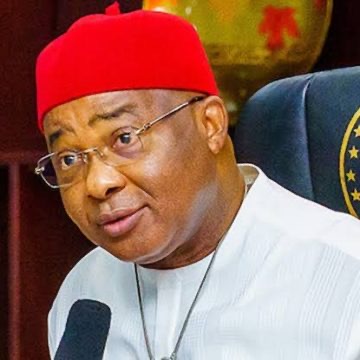Governor Hope Uzodimma of Imo State, is shopping for a fresh nominee as the substantive State Chief Judge in the State, amid criticisms by group of law experts in Abuja.
This followed the rejection of Justice Theophilus Nzeukwu, the fourth most senior judge in the state’s Judiciary he earlier shortlisted and recommended to the National Judicial Council in acting capacity.
NJC had in statement endorsed by its Deputy Director of Information, Kemi Ogedengbe on Friday April 4, 2025 in Abuja, disassociated itself from the appointment of Justice Nzeukwu, — who ranks fourth in the hierarchy of judges in the state — the NJC has yet to consider the request.
Accordingly, the NJC, urged the general public to note that it is not a party to the purported appointment.
The development, has triggered a backlash by the lawyers for Civil Liberty led by Victor Opatola who have warned that Governor’s move could set a dangerous precedent for Governors to pick Chief Judges like their personal aides.
Again, the pressure group, faulted the hardline posture by the Governor and demanded that due process must be followed in the appointment of a Chief judge in the State.
The lawyers argued that Uzodinma’s action “is not only unconstitutional, but it undermines the entire structure of judicial order, seniority, and independence”.
This development in Imo State is worrisome considering that “this is not the first time such issue of bypassing judicial seniority in selecting a Chief Judge”, according to the non partisan group.
The group also recalled that “In 2021, Hon. Justice C.A. Ononeze-Madu, the second most senior judge, was sidestepped, while Justice Theresa Chikeka was appointed. And now, the fourth in the line of seniority is has appointed, again in violation of constitutional standards.
“This repeated pattern should deeply trouble every stakeholder in the Nigerian judiciary. It is not a mistake, and unless the National Judicial Commission takes a firm and immediate stand, this behaviour will harden into precedent.
“We are aware of various efforts at justifications premised on the ground that the three most senior judges are not appointable. We most humbly state that such decision is for the council (NJC).
“In this case, we believe that there are no excuse, no justification and no political convenience that should override Section 271 of the Constitution.
“This is not just about Imo State. What is allowed today becomes the norm tomorrow. If this goes unchecked, governors across the federation will feel further emboldened to choose Chief Judges like personal aides; appointing favourites over the most senior, most qualified judges.
“When junior judges accept appointments they know are not theirs to take, they do more than violate tradition. They undermine the very structure that legitimises their office.
“And, when the NJC fails to act, it sends a dangerous message: that the rules are bendable, that political convenience can trump the constitution, and that the judiciary is no longer guided by principle and law, but by influence.
“Right now, silence is not golden, NJC must not just frown in silence; it must speak. It must investigate. It must discipline. Because every time it fails to act, it confirms the public’s worst fears.
“We must insist on fidelity to the Constitution—not because it is convenient, but because it is essential.
“We must demand that those who lead our courts be men and women who have risen by merit, not by proximity to power and influence.
“We must remind ourselves that every act of silence in the face of abuse enables and emboldens the abuser.
“The people are watching, so are the lawyers, who still believe in the majesty of the law. And, if the NJC will not act, then it, too, must answer for what the silence has cost us.
“Justice does not defend itself, it requires guardians. And in this moment, the Judiciary must prove that it is strong enough to resist those who would bend it, and humble enough to correct its own missteps.
“If it cannot, then the fear is no longer that justice will be delayed—but that it will be forgotten”, according to the group of lawyers.









Leave a Reply